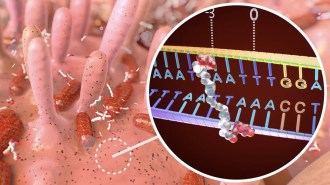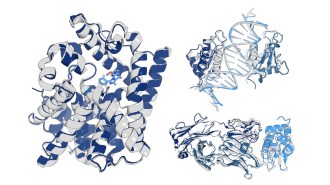Over the past several years, researchers have made great strides in creating synthetic molecules that act as rudimentary computer switches (SN: 9/20/03, p. 182: Available to subscribers at Molecular Memory: Carbon-nanotube device stores data in molecules). But making something that produces motion—a motor—has proved much trickier.

Now, a team of chemists at the University of Colorado at Boulder has taken a step in that direction by creating rotors out of individual molecules mounted on gold surfaces. Besides transferring their motion to other parts of a nanomachine, their rotors could lead to new types of sensors and even intelligent materials that respond to their environment.
Led by Josef Michl, the Colorado group fashioned the tiny rotors out of several components. Each rotor consists of two paddles attached to a shaft that lies parallel to the gold surface. The shaft extends between two molecular stands anchored to the surface with a starlike spread of legs. The entire complex, which the researchers describe in an upcoming Journal of the American Chemical Society, comprises a mere 350 atoms.
The rotors turn spontaneously in random directions at room temperature. However, by applying an electric field, the researchers can control the rotor’s speed and direction of rotation. That’s because one of the paddles contains negatively charged fluorine atoms that respond to the electric field.
“This is a beautiful system,” says Ben Feringa, a chemist at the University of Groningen in the Netherlands. In recent years, a number of research groups have synthesized molecular motors, but mainly in liquids, where the devices are easier to activate with light or a chemical stimulus.
The big challenge, says Feringa, is finding ways to couple molecular motors to the outside world so that they actually do some useful work, such as pump a fluid or close a valve.
Although Michl’s team achieved control over its surface-mounted rotors with an electric field, the rotor turns only about once a second. “This is just a first step,” Michl says, suggesting that microwaves or light might be used to achieve much higher rotation speeds.
The U.S. Army, which funded the research, is eyeing the technology as the basis for protective coatings on goggles that would shield soldiers’ eyes from blinding lasers. The coatings would consist of arrays of molecular rotors activated by specific frequencies of laser light. In their initial position, the paddles would rest perpendicular to the goggle surface and allow light through. Should a dangerous laser pulse strike the goggles, the rotors would push the paddles into a parallel position to block out the incoming light.
Michl also envisions adding more paddles to each rotor to produce what he says “begins to look like a waterwheel.” In nanofluidic devices, he notes, these waterwheels could shuttle tiny volumes of liquid around on a chip for such uses as genetic screening or chemical sensing.






